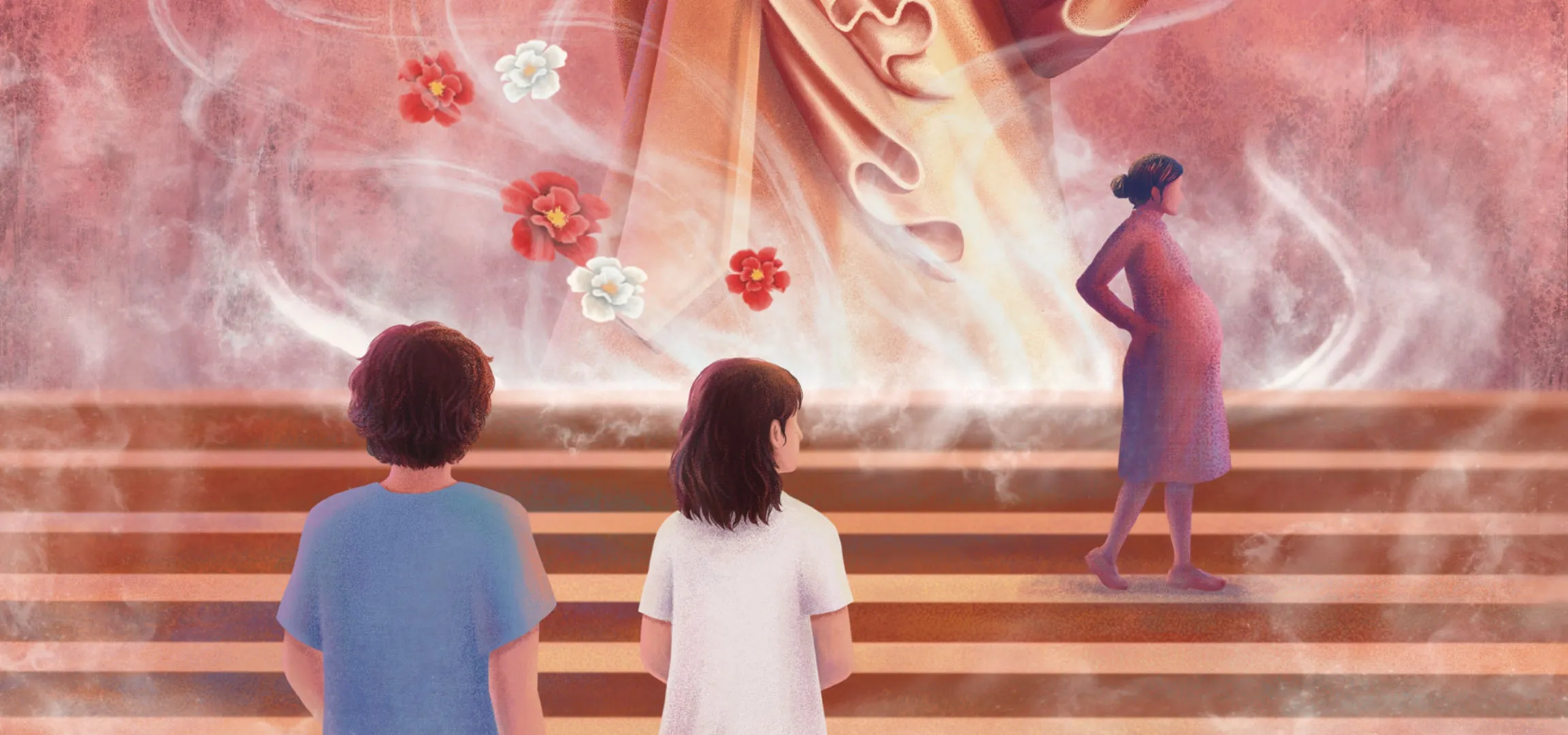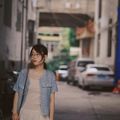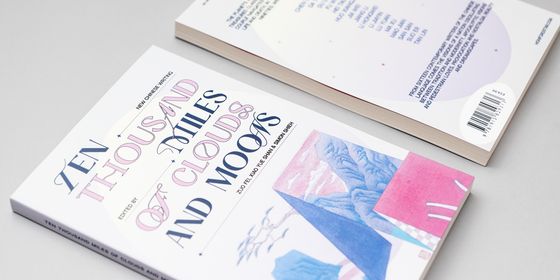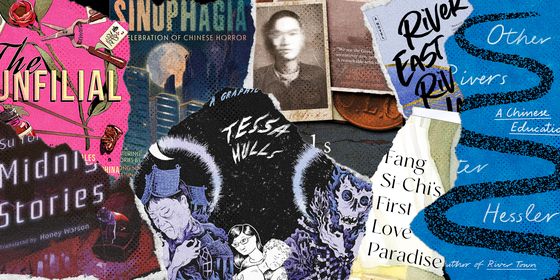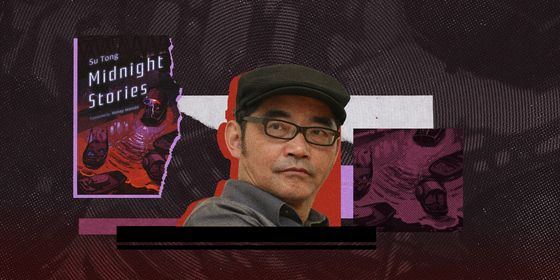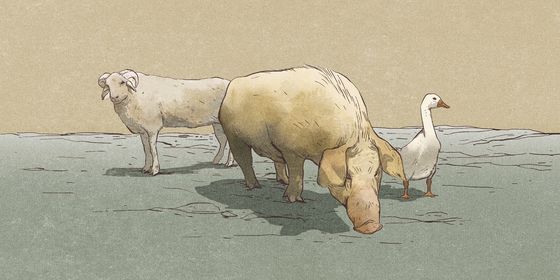Cheng Huizi tells a heartfelt story of the love between mother and daughter in a society that often values sons more highly
Afraid of missing the bus, I set an alarm for 6:30, but when I woke up, it was not yet 6. I wiped the sleep from my eyes and lay in the dark, listening to my mother shuffling across the kitchen floor in her slippers. The next things I heard were the sound of water boiling in a pot and my mother whisking eggs with chopsticks. After I got up, she watched me slurp up the eggs poached in brown sugar syrup.
There were all sorts of people on the bus. One man pulled his mask down to his chin and stuffed himself with a fried dough stick. Beside him, an older man, perhaps his father, with gray hair sticking out from under the man’s cap, smacked his lips and ate a sticky rice and chicken dumpling. He meticulously licked up stray grains of rice from the steamed lotus leaf that the dumpling had come wrapped in. As we came up to an intersection, the driver slammed on the brakes, and the chicken and rice fell into his lap. When the son heard his father choking, he hurriedly poured soybean milk down his throat. The woman seated behind them noticed that her daughter’s pink mask had slipped down and rushed to pull it back up.
The bus left the skyscrapers behind, entered and then exited the expressway, with the landscape becoming progressively more desolate. Before we reached the station, I saw smoke on the horizon, as if fields were being torched. When we got closer, I saw that it was a rich cloud of incense rising to the sky.
Out the window, I saw an archway with three gates, four pillars, and five roofs, and beyond it a wide square, on which sat the magnificent main hall. Around the square were several censers as big as water barrels, each one full of incense sticks of unequal heights. In the crowd assembled in front of the main hall, each person, whether they were bowing or holding up their hands to pray, clutched the incense. Up front, the driver shouted, “Longmu Temple! Grab your things and get off!” My mother nudged me and I turned to see the rice scattered across the bus seat.
Before you pray to Longmu, the Mother of Dragons, you must first wash your hands and face. The rule is that you must touch the dragon-shaped faucet three times. The stream from the faucet was not a gushing torrent, but neither was it a trickle. My mother filled her hands with water from it and bent down to wash her face. The hair at her temples was wet when she was done. She wanted me to wash, too, but I didn’t feel like it. She was unhappy. She didn’t want to upset me, though, so she only said, “We got here with plenty of time. Go wash up. You can’t pray with dirty hands!” When I saw there was no way to dissuade her, I went over and took a quick scrub with a wet towel.
After washing our faces, we went into the main hall to pray at the statue of Longmu. The father and son from the bus were ahead of us in line, as well as the younger man’s wife, who was holding a little girl in her arms. Father and son knelt and kowtowed, tapping their foreheads on the floor three times. The son helped his father up. The older man stood shakily for a moment, then started moving, still not particularly steady, toward a table nearby. On the table were two long boxes that each contained two more boxes that were filled with expertly folded paper flowers. One box had red flowers, the other had white flowers. White flowers were to pray for a son. Red flowers were to pray for a daughter. The box with white flowers was already almost empty. The young man chose a white paper flower and handed it to the woman. He took the child from her arms. Taking offerings from her bag, the woman knelt and kowtowed three times to Longmu. I could hear her muttering the address of the family home. She hoped for a son in her womb this time. The girl, restless in her father’s arms, called out for her mother. When the woman stood and took the child, she grew peaceful again.
When it was my mother’s turn to pray, she took from her bag six apples and a bunch of grapes. From her pocket, she produced seeds and fruits—jujubes, peanuts, longan, lotus seeds—whose homophones in Chinese spelled out a phrase that meant “give birth soon to a son.” She held these things above her head and kowtowed. A bit slower than my mother, I knelt and kowtowed, too. I caught sight of the back of her head and found myself shocked by the bald patches with only a few stray gray hairs draped across them. My mother stuffed a hundred yuan bill into the collection box, leaned back, and prayed: “Please bless my daughter by letting her give birth to a son soon. Let it go smoothly. Let everything be perfect. I will come back each year to offer incense.”
When it came time to choose the paper flowers, my mother asked for one of each color, but the man minding the table told her that she could only choose one. My mother told me to choose, but I said that I wouldn’t. She stood for a time in front of the table and then finally chose a white paper flower. She told me to hold it against my body and pray again to Longmu.
I looked up and saw Longmu above me, poised with all the grace of a maiden, her crowned head, pale face, and bright red lips framed by a heavy curtain. To her left and right stood two children. It was impossible to tell whether they were boys or girls. She gazed straight ahead, not deigning to look at those kowtowing at her feet. Her expression was peaceful. People took it as compassionate. When I entered the room, I had looked at the stone tablet that related the legend of Longmu: she was born to poor parents, and when she was still a baby, they put her into a basket and set it adrift in the river, abandoning her to fate because she’s a girl. Fortunately, she was astute and the journey didn’t end in disaster. The basket was eventually swept by the river alongside a fishing village. She was adopted by an old man who was casting nets there, and her spirit blessed him with greater catches than he had ever known. Longmu grew up. One day, after the old man brought carp home to feed her, she choked on a bone and died.
Now, it is forbidden to eat carp before going to pray to Longmu.
She is a god, but she is also an abandoned child.
As I kneeled on the pad in front of the statue, I thought back over the past couple of weeks. I could not remember my mother serving fish even once.
I don’t know whether or not my mother came to pray to Longmu before she gave birth to me. I heard from others that she had a difficult time. She struggled to conceive and some people told her it must be a boy. They were disappointed. I heard that my father’s mother broke down and sobbed when she found out that I was a girl. When my mother divorced, she told anybody who asked about me that she was going to raise her daughter like a little boy. Right until I finished my graduate degree, she made sure I went to the best schools and made sure I took the same approach to work and marriage. She was pleased to learn that I made more money than my husband. She said I was just as good as a boy and I had made her proud. I knew that when I was in school some friends had advised her to have another child, even if it meant hiding out in the countryside to avoid the enforcers of the one-child policy. She didn’t do it. She said, “My girl is better than any boy.”
After leaving the main hall, you are supposed to put joss paper and the incense you held in front of Longmu in one of the censers on the square. Each stick of incense only sends up a tiny, curling thread of perfumed smoke, but as countless people plant them in the censers, they create a billowing cloud. I noticed the family that went before us to Longmu in the square, too. They planted their incense and then bowed in each of the cardinal directions. While the woman held her daughter, the husband helped his father to bend at the waist. The woman, with the girl balanced on her belly, struggled but did her best to bow. I noticed then that she was pregnant and almost at full term.
My mother bowed in each direction, too. I stayed where I was, not moving.
During the Lunar New Year, my mother-in-law said: “A life without children is meaningless.” My mother heard her. It was not the first time that she had heard remarks like that. After eight years of marriage, the remarks came intermittently, like scattered showers. But after turning thirty, the comments, voiced and unvoiced, seemed to come from all directions. It was as if the rain only grew heavier and harder, drenching me to the bone. Still, I didn’t feel like my life was meaningless. My husband said the same.
But for some reason, I couldn’t escape the feeling that I had a new burden. It even made it hard to sleep. Neither of us said anything out loud about having children, but, tacitly, we came to a decision.
My mother told me to bow. I held the white paper flower in my hand. It felt as if there was a belt of thorns around my middle, and I could not bend. “You wish I had been a son, don’t you?” I asked.
My mother was stunned. She stared at me for a long time. She could not speak, as if she had a fishbone caught in her throat. At that moment, a bundle of incense in the censer crumbled to ash. I walked away, tears streaming down my face. On the bus home, I didn’t see the family from the temple. The dropped grains of rice were still there, turning gray in the dust on the floor, trampled by countless feet.
My mother sat beside me and remained silent for the entire trip. We had already been to pray at many temples and shrines together, but there were no results and I had already given up hope. After my mother heard that a woman in her fifties who prayed at the Longmu Temple got pregnant, she dragged me there with her. She heard that three sets of prayers to Longmu over three years would grant any wish. She was probably ready to go back there every year to make offerings.
I walked my mother home. She lived alone in a small apartment. I washed my face and was about to leave. She called me back.
“I never regretted having a daughter,” she said. “I never thought you must have a boy.” She handed me a box. Her eyes were red. “I told Longmu the same. I think having a girl is great. It’s much better than having a boy.”
She went on: “But today, I saw that woman in front of us in line, pregnant, with nobody to look after her. I was worried that if you had a girl, everyone would push you to have another one. You would suffer. Once your daughter had a little brother, she would suffer too.” Tears fell from her eyes and she wiped them with the back of her hand. “I want you to have an easy life. I don’t want you always comparing yourself to other people. I don’t want you to feel pressured. I don’t want you to have a tough life like I did, always being chided by other people.”
When I looked at the box she had handed me, I saw that it was full of red paper flowers she had folded herself, a gesture definitely not authorized by Longmu.
I ate dinner with my mother. Even though her small room was always tidy, and there wasn’t much need, I helped her clean up. I started sweeping in the kitchen and my mother started in the bedroom. We met in the living room and mixed our dust together.
On the way home, I tossed the garbage into a trash can by the road, along with the white paper flower. As the moon shined bright overhead, the sidewalk glowed as white as snow. I wished with all my heart that the woman from the temple would give birth to a son.
Author’s Note:
Last summer on my way to Zhaoqing, Guangdong province, I stopped at Longmu Temple to get a peak of the booming traffic there. Who would have thought that the goddess, known for blessing worshipers with children, was once an abandoned infant herself? In Beijing, Yonghegong, or Lama Temple, is now a popular destination among young professionals praying for career success. Meanwhile, on the distant southern coast, small-town people drag their whole family to the temple, hoping for a male heir. What a peculiar scene, where traditional beliefs and modern predicaments coexist on the same piece of land.
Red and White | Short Story is a story from our issue, “Education Nation.” To read the entire issue, become a subscriber and receive the full magazine.





